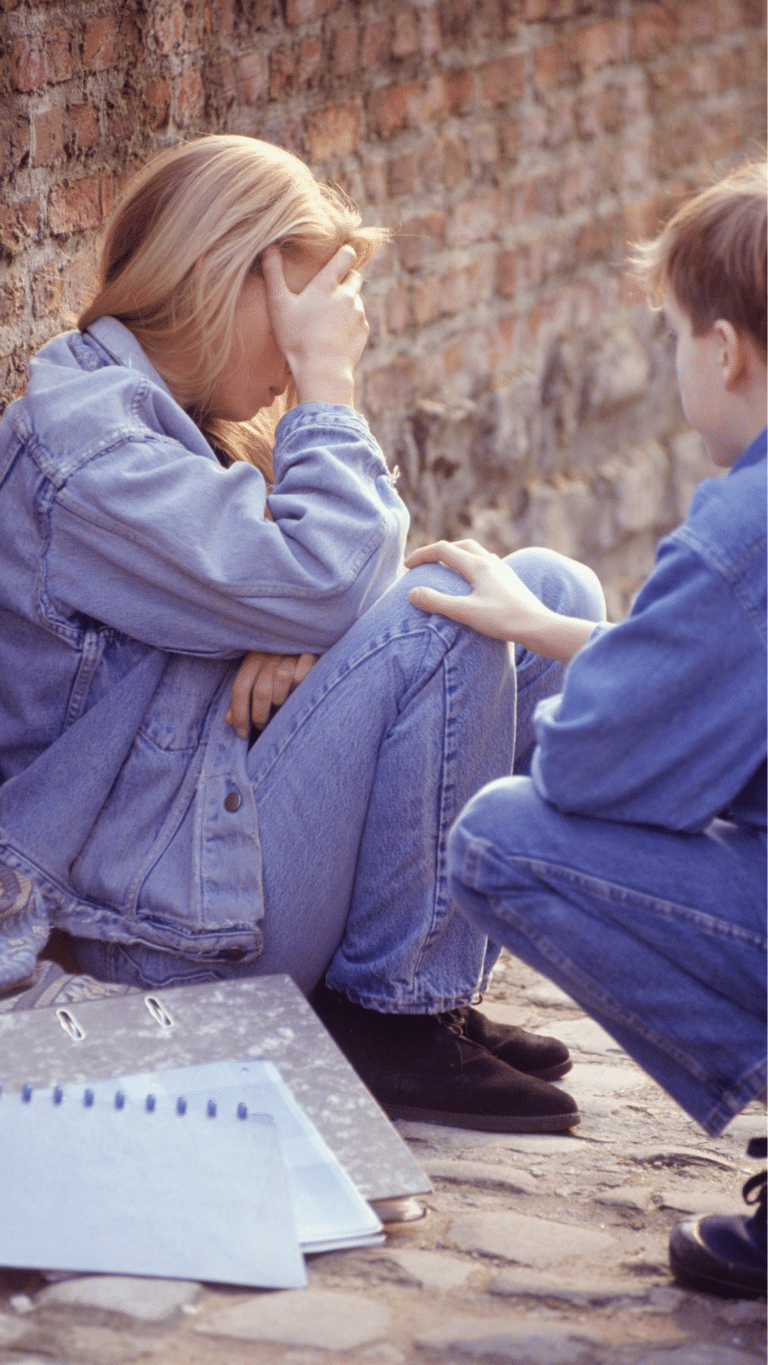Long-Term Effects of Childhood Sexual Abuse
Individuals who experience child sexual abuse can face many difficulties as they grow into adulthood. However, there are resources and help available to move forward.

Have you experienced sexual assault or abuse?
We can help answer your questions and connect you with an attorney if you may have a case.
"*" indicates required fields

Author: Kathryn Kosmides
Survivor Advocate
Home » Child Sexual Abuse » Long-term Effects of Child Sexual Abuse and Molestation
- Long-term effects of child sexual abuse may include PTSD, depression, anxiety, substance abuse, relationship issues, and revictimization in their adulthood
- Short-term effects of child sexual abuse may include anxiety, depression, falling behind in meeting childhood milestones, becoming sexually precocious, and revictimization
- If you or someone you know experienced childhood sexual abuse, you have rights and options and we’re here to help support you in understanding them
Child sexual abuse and molestation come with serious long-term effects. Child abuse is known to cause serious harm to a victim’s lifelong mental and emotional health. These consequences can create a domino effect, rippling outward to affect a victim’s relationships, physical health, educational success, earning ability, and quality of life.
The CDC estimates that 91% of childhood sexual abuse is perpetrated by someone the child knows. Children often do not report sexual abuse. Sometimes, this is out of fear or shame. However, not all child sexual abuse happens in the same way. When a child is molested, they may not realize until adulthood that they were the victim of sexual abuse.
The statutes of limitations for taking legal action over childhood sexual abuse are set on a state-by-state basis. In recent years, there has been a national movement toward re-examining and lengthening the statutes of limitations surrounding childhood sexual abuse. This has led to an increase in adult survivors coming forward decades after the abuse occurred. If you were molested as a child or the victim of abuse, it’s never too late to seek help and pursue justice.
- Rape or attempted rape
- Sodomy or oral sex
- Insertion of fingers or objects
- Fondling or inappropriate touching
- Being asked to expose or watching another expose themself
- Being asked to masturbate or watching another masturbate
- Being photographed or recorded
- Being shown pornographic materials
Child sexual abuse can happen to anyone, regardless of their demographics such as religious, race, gender, or sexuality. In most cases of child sexual abuse, the child knows the offender in some capacity such as a teacher, coach, babysitter, clergy member, or a relative. Institutional child sexual abuse is a major problem including religious, doctor, school, and within child services like wilderness therapy and foster care.
- Types of Childhood Sexual Abuse
- Potential Long-Term Psychological Effects of Child Sexual Abuse
- Potential Long-Term Behavioral Effects of Child Sexual Abuse
- Potential Long-Term Interpersonal Impacts of Child Sexual Abuse
- Potential Long-Term Physical Effects of Child Sexual Abuse
- Want To Speak With A Lawyer?
Psychological Effects
Child sexual abuse and molestation are linked to a range of serious mental health issues. Mental health issues stemming from childhood sexual abuse can begin shortly after the abuse occurs but may not appear until many years later.
Delayed mental health issues related to childhood sexual abuse may be due to the fact that in childhood, a victim might not fully understand what is happening.
Molestation, in particular, might be confusing to a child. When abuse is not painful for a victim, it may not be until adulthood that the victim fully realizes what occurred. Studies increasingly show that adult survivors often do not recall childhood sexual abuse until asked about it.
Whether a victim immediately recognizes the experience as abuse or does not realize it until adulthood, they are at risk of developing similar mental health concerns. Here are some of the most common mental health issues survivors of childhood sexual abuse face.
PTSD
Post-traumatic stress disorder (PTSD) is one of the most common psychological effects of childhood sexual abuse. Studies show that PTSD related to this type of abuse is more likely to manifest in adulthood. PTSD can manifest differently in different individuals. Common signs of PTSD include:
- Reliving the event through flashbacks or memories
- Avoidance of intimacy or sexual relationships
- Emotional effects like numbness, fear, or shame
- Loss of memory of the event
- Hyperarousal – easily startled, difficulty with sleep and concentration
PTSD is a complex psychological condition that can increase the likelihood of other issues like depression, anxiety, substance use, and suicide.

Depression

Studies routinely confirm that there is a significant correlation between childhood sexual abuse and adult depression. Depression can have an overwhelming impact on quality of life and can last for short periods or years. Depression manifests in many different ways. Common symptoms of depression include:
- Sadness or emptiness
- Anger or irritability
- Loss of interest in life activities
- Sleep disturbances, insomnia, or sleeping too much
- Lack of energy
- Loss of appetite and weight loss
- Overeating and weight gain
- Feelings of shame, worthlessness, and low self-esteem
- Cognitive difficulties – thinking, memory, recall
- Suicidal ideation or suicide attempts
Depression is a serious mental health condition. Left untreated, it can lead child sexual abuse victims to commit suicide.
Anxiety
Survivors of childhood sexual abuse are also at risk of developing anxiety disorders, both in childhood and in adulthood. Anxiety disorders can manifest in many different ways. One can broadly identify anxiety as feelings of apprehension that have serious effects on thoughts, emotions, actions, and quality of life.
Common signs of an anxiety disorder include:
- Feelings of panic or danger
- Nervousness or restlessness
- Increased heart rate or breathing
- Overwhelming worry
- Sleep and cognitive issues
Severe anxiety requires medical intervention. If a person with severe anxiety does not receive treatment, the condition can worsen.

Behavioral Effects
The behavioral effects of childhood sexual abuse are closely linked to the psychological effects. In many cases, behavioral effects appear as coping mechanisms to help victims deal with co-occurring mental and emotional issues.
Substance Abuse
Studies consistently find a high correlation between childhood sexual abuse and dependence on alcohol and drugs. One study conducted on adults at an inpatient substance abuse detox center found that 81% of women and 69% of men reported physical childhood sexual abuse.
There’s also a known correlation between childhood sexual abuse and alcohol abuse later in life. This is a particularly complex topic, as it’s believed that family alcohol abuse is likely a contributing factor in the sexual abuse of a child. This suggests that a family history of alcoholism can contribute to both sexual abuse and the likelihood of a victim going on to abuse alcohol.
Substance abuse comes with pervasive effects on every area of life and can lead to serious negative consequences for psychological and physical health. It also negatively impacts relationships, education, and earning ability.
Eating Disorders
Studies have also found a strong correlation between childhood sexual abuse and the development of eating disorders. Eating disorders can take several forms, including:
- Anorexia nervosa
- Bulimia nervosa
- Binge-eating disorder
- Rumination disorder
- Avoidant or restrictive food intake disorder
One view is that eating disorders can be a dysfunctional coping mechanism that allows victims to establish a sense of control over the body. Eating disorders are highly dangerous and can lead to malnutrition and a host of other physical conditions.
Sexual Risk Behavior
Victims of childhood sexual abuse are more likely to engage in sexual risk behavior. Sexual risk behavior is linked to sexual abuse in childhood and is accompanied by many negative consequences, including:
- Higher likelihood of further sexual abuse
- Teen pregnancy
- STIs
- HIV
Sexual risk behavior can take many forms. Some of the most common involve unprotected sex, sex with multiple partners, and sexual activity at an early age.
Interpersonal Effects
Sexual abuse in childhood can lead to a wide range of interpersonal issues. Relationship problems, unstable family dynamics, and sexual issues have all been linked to childhood sexual abuse.
Relationship Issues
Victims of childhood sexual abuse often face high levels of relationship difficulties. Common issues include:
- Trust issues
- Fear of intimacy
- Unstable relationships
- High divorce rates
Childhood sexual abuse can affect intimate and romantic relationships as well as parenting and family dynamics. Data shows that childhood sexual abuse victims experience greater difficulty in establishing and maintaining safe, healthy relationships than those without a history of this type of abuse.
Sexual Dysfunction
Adult survivors of childhood sexual abuse routinely report issues with sexual dysfunction in adulthood. Women with a history of abuse report higher levels of difficulty with desire and arousal.
For both men and women, the presence of PTSD symptoms can contribute to the occurrence of issues with sexual desire, arousal, and performance. Many survivors of child sexual abuse struggle with PTSD, anxiety, depression, and difficulty forming trusting relationships. These issues can be compounded when survivors later experience abuse again — such as during adulthood in situations like rideshare sexual assault which can deepen existing trauma. Legal actions such as filing a civil lawsuit can help survivors move forward.
Revictimization
Revictimization refers to repeatedly falling victim to the same crime. Victims of child sexual abuse are at high risk for continued abuse. An estimated 50% of child sexual abuse victims experience revictimization.
Victims are at higher risk of further sexual abuse in childhood and adulthood. For adults, the additional psychological and emotional effects of childhood sexual abuse may lead to a decreased ability to perceive danger as an adult. Adult victims may also have a higher tolerance for sexually coercive situations due to the normalization of traumatic sexual experiences in childhood.
Studies have also shown that an estimated 35% of sexual abuse perpetrators were victims of childhood sexual abuse. Men are at a much higher risk of falling into this cycle of abuse than women. Recognizing abuse and getting adequate counseling for a victim can greatly reduce the chances of a victim perpetuating the cycle of abuse.
Physical Effects
Childhood sexual abuse can range from painless to traumatizingly painful. Oftentimes, victims may experience immediate injury, STIs, or pregnancy. However, childhood sexual abuse is also linked to many long-term consequences for physical health.
Data shows that adult survivors of childhood sexual abuse are at higher risk of developing:
- Heart disease
- Cancer
- Diabetes
- Obesity
- STIs
- Teen pregnancy
In addition to these direct physical health consequences, the psychological, emotional, and behavioral effects further contribute to poor physical health and associated conditions.
Depression and anxiety can lead to suicide, suicide attempts, and self-injury. Sexual risk behavior can lead to increased rates of STIs, HIV, pregnancy, and abortion.
Substance abuse poses a high risk to physical health in many ways, including an increased risk of:
- Lung disease
- Heart disease
- Liver disease
- Kidney failure
- Stroke
- Cancer
- Dental problems
- Nerve damage
- HIV
- Hepatitis C
- Heart infection
- Skin infection
Eating disorders lead to a wide range of serious physical health conditions, including:
- Starvation
- Malnutrition
- Cardiovascular problems
- Gastrointestinal issues
- Neurological issues
- Hormonal imbalance
The physical effects of childhood sexual abuse are highly complex. Physical health consequences are closely tied to the psychological and behavioral health of a victim. Psychological symptoms can manifest as coping mechanisms for dealing with the unresolved trauma of sexual abuse in childhood.
The level of support a survivor receives can have a direct influence on long-term outcomes. One survivor might get counseling early and go on to experience mental, emotional, and physical health. Another victim may never receive treatment and go on to experience any combination of the many possible effects listed above.
With a combination of medical intervention, therapy, and medication, a survivor can find relief from the harsh consequences of childhood sexual abuse.
Want To Speak With A Lawyer?


